Summer is almost over. I know, I know! Some of you are clapping your hands over your ears and muttering “I can’t hear you, I can’t hear you”, but it’s happening. Remember when you were a kid and summer lasted forever? My sister and I spent the summer swimming, horseback riding, and searching for four-leaf clovers under the shade of the apple trees. Sandwich in trips to the library and new puppies and kitties to play with – there’s a perfect recipe for summer that still brings sighs of happiness. Hopefully your kids are still experiencing their own version of summer happiness.
On the days when it’s rainy or too hot to get outside, let’s play a math card game. This week’s game is Equal Quotients from Math Card Games book, game D6. We’ve been working with addition, subtraction, and multiplication this summer. Now it’s time to refresh the division facts. For those children who don’t know their division facts or are not solid with them, they can still play using their handy-dandy Short Multiplication Chart.
Two to four people can play this game. Remember to grab older kids, neighbor kids, or grandparents to play! If you have a surplus of players, go with partners so everyone can enjoy the fun.
Use the basic number cards without the 0s and 1s and the multiplication card sets greater than 2. If you have just two players, you can decrease the number of multiplication sets. Deal each player four basic number cards and four multiplication cards.
Using the cards in hand, the players lay a multiplication card and a basic card which now becomes a division problem. The quotient must not be greater than 10 and cannot have a remainder. Here we have 35 and 5 to be read as 35 ÷ 5. Our quotient, the answer to the division equation, is 7.
After each turn, the players pick up one of each card, keeping four of each card in hand.
The next player attempts to form a division equation with the same quotient as one on the board, 7 in our case. If he can lay down two cards with the same quotient, he removes the cards from that row and collects the multiplication cards.
If he does not have the cards to make the quotient, he starts a new row by playing a new division quotient.
Since our second player doesn’t have anything to create a quotient of 7, he will have to start a new row. Now there are two quotients to consider.
Our first player doesn’t have cards to create a quotient of 7 or 2. She’s starting a third row….
Oh yeah! Did you see the second player’s cards? He can lay two cards to create a quotient of 2!
He gathers the cards and sets them aside. He has two points now….
The first player can lay 21 and 3 on the first row and gather those cards. Score is tied right now!
If a player cannot play any cards, they may replace two cards in their hand by burying them in the proper stack, draw two new cards, then skip their turn.
The winner of the game is the one who collects the most cards. Well, actually, the winner is the child who becomes more confident with their division facts and has great fun at the same time.
Well, I’m off to play Equal Quotients under my apple tree….. I might even spot a four-leaf clover and get lucky with quotients!

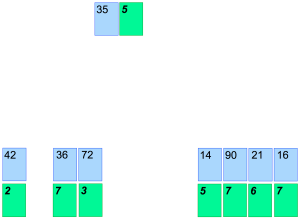
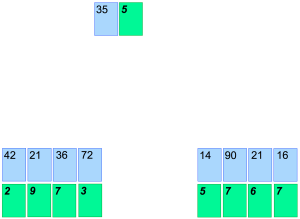
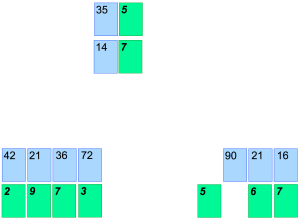
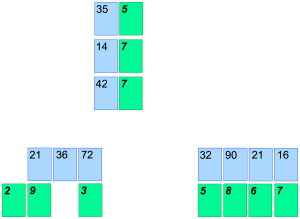
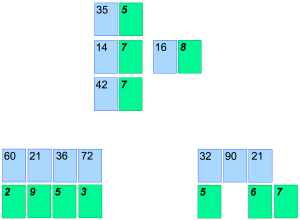
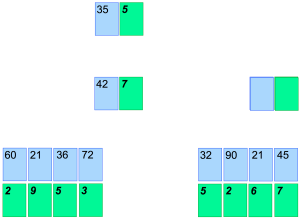
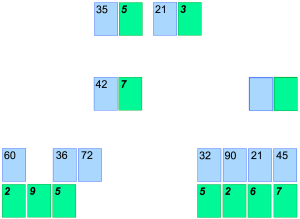

I have really enjoyed these wonderful math games and especially hearing your stories that personalize them.
I am teaching a remedial math class at our local community college this fall and plan to incorporate math card games!
I also like the stories. This game, though…I think I’ll need to play through to figure it out. Still, I really do like the colors in the graphics, so good job!
Thanks, Jill!